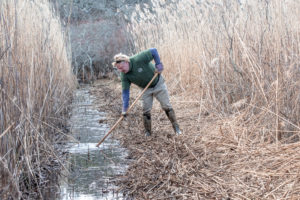WELLFLEET — Last summer, the part of the Herring River estuary near Duck Harbor Beach became the epicenter of a miserable mosquito outbreak. Cape Cod Mosquito Control, following discussions with the Cape Cod National Seashore that began in mid-May, finally received a permit in July to spray those waterways with larvicide — but by then, it was too late. The mosquito boom was already in full swing.
Mosquito Control forged ahead, its crews struggling to find their way through expanses of the thorny, impenetrable brush that lines the banks of the waterways. It took another round of talks with the Seashore to secure a second permit in August to break out the brush saws and carve access paths to the water’s edge. The tangled, overgrown landscape limited treatment to “maybe 20 percent of the breeding habitat,” the Mosquito Control Supt. Gabrielle Sakolsky told the Independent in September.
While mosquitos are largely dormant during the winter, Sakolsky and her crews have been spending the last few months hustling to prepare for the summer ahead. Staff members spent many winter Saturdays continuing to clear those paths. They’ve also been pulling fallen trees and dead vegetation from mosquito ditches in the Herring River system, allowing once-congested waters to start flowing again. Mosquitos prefer standing water for egg-laying.

The system looks relatively manicured now, Sakolsky told the Independent in a phone interview, and “the water just rushes through there and pushes everything out of the way.”
Then, on Tuesday, April 5, Mosquito Control officials got the news they were hoping for from Cape Cod National Seashore Supt. Brian Carlstrom. They received a permit from the Seashore that will allow them to get started on administering larvicide now.
Sakolsky and her crews have been monitoring the waters regularly, dunking a dipper beneath the surface, scooping up a sample, and counting the number of larvae in each sample. If the count exceeds an average of 10 larvae per dip in a given area, then that location has passed the threshold for treatment with larvicide, according to the management plan established between the Seashore and Mosquito Control.
As for the Duck Harbor area, Sakolsky said on March 29 that the sample averages had already begun to exceed this threshold, particularly in the parts with shallower, warmer waters. “There are already a lot of mosquito larvae that have hatched and are developing,” she said.
All things considered, Sakolsky is optimistic that this summer will be better than last. Her staff will have better access with paths to the ditches cleared, and now, with Tuesday’s green light, at least some areas will get timely larvicide treatments.



